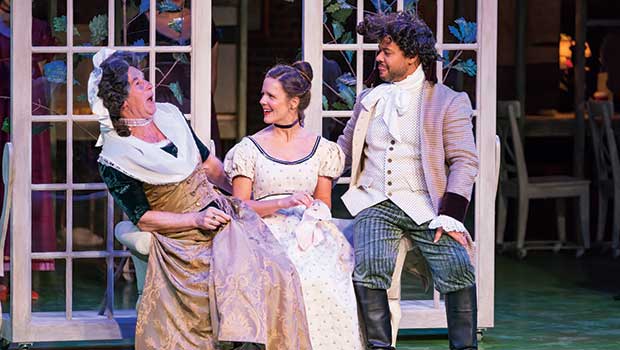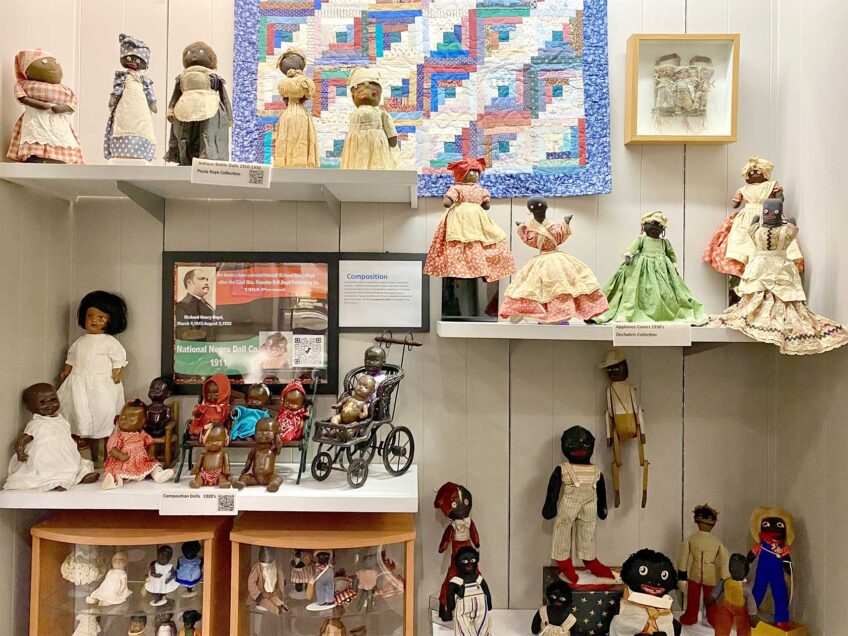‘Bedlam’s Sense and Sensibility’
A kinetic, minimalist staging of a Jane Austen classic

Jane Austen’s 1811 novel “Sense and Sensibility,” was her first published book, and, like her other masterpieces to come, it portrays the quest for love, marriage and money among the people she knew best — 18th-century English gentry — with wry wit and wisdom.
Mining the story’s timeless humor and insight is New York-based theater company Bedlam’s inventive production, “Bedlam’s Sense & Sensibility,” on stage at the American Repertory Theater in Harvard Square through Jan. 14.
As Austen’s story opens, the patriarch of the Dashwood family dies, leaving his estate to his son, a fop whose greedy wife protests his intent to heed his father’s dying request — that he take care of his mother and two sisters, Elinor and Marianne. The three women must leave their stately house, now occupied by the son and his family. A benevolent relative offers Mrs. Dashwood and her daughters a cottage in the countryside, where despite their diminished prospects, the sisters draw suitors. Elinor, who embodies sense, as in wisdom and good judgment, attracts the kind and honorable Robert Ferrars. Her romantic younger sister, Marianne, is entranced by the dashing John Willoughby and spurns the older and more reliable Colonel Brandon, whom Elinor describes as “a sensible man.”
Swirling around these five core characters is an array of distant relatives and neighbors whose self-seeking intrigues complicate the sisters’ path to love and marriage and lives that balance sense and sensibility.
Transforming this social satire into a live performance faithful to the novel’s heart, wisdom and humor, Bedlam’s production, running two hours and 15 minutes with one intermission, is theater at its most fundamental.
Playwright and actress Kate Hamill wrote the adaptation and played Marianne in Bedlam’s critically acclaimed off-Broadway productions, both the 2014 premier and a six-month run in 2016. Leaving behind the knowing guidance of the novel’s narrative voice, the adaptation is all show and no tell. Likewise, the staging, orchestrated by Bedlam artistic director Eric Tucker, plunges right into the action.
True to its name, the Bedlam troupe creates a ruckus. The company is known for tackling the classics with a kinetic, pared-down approach that distills their emotional essence while remaining faithful to the texts. Central Square Theater in Cambridge has hosted Bedlam productions of “Saint Joan” and “Twelfth Night,” and in March, ArtsEmerson will present Bedlam’s “Hamlet and “Saint Joan” at the Cutler Majestic Theatre.
Bedlam’s minimalist staging demonstrates the power of live theater to cast a spell through acting, words, sound and spectacle, with the audience as knowing, complicit partner.
The staging asks a lot of the cast, 10 actors who play 20 characters. An ensemble of solid character actors, they are also as agile as circus clowns. While playing their roles straight, they employ all the tricks in an actor’s book, including plenty of dance and moments of improvisation and semi-spontaneous exchanges with audience members.
Seeing the same shape-shifting actor who is an ardent suitor become a moment later a mumbling dowager and believing in both, the audience is aware of its willing part in the artifice.
At the ART, the audience sits on both sides of the ensemble’s long, narrow performance area. Overhead are four scenes of an idyllic English countryside.
As the show begins, the cast comes out in casual jeans and sweaters and leaps into pulsing, high-energy dancing to a punk rock track. The music then changes to a country air, and, thanks to Angela Huff’s versatile costumes, the actors strip off their outer wear to unfurl period attire and move into the enforced order of a country line dance.
Now dressed as English gentry, they babble at each other all at once. The air crackles with the crow-like cacophony of their voices. Later, a jealous wife howls like a wolf, acting out feral impulses only implied in Austen’s text.
Dramatic payoff
The actors also move around John McDermott’s mobile sets, which are mounted on casters. These items include French doors, window frames (the better for peering in on private conversations) and chairs. Before our eyes, one scene molts into another, with the same speed as the costume changes.
Gossip becomes a visible force as, through Alexandra Beller’s choreography, the ensemble swarms into a whirlpool, bodies miming the momentum of hearsay and half-truths that surrounds the sisters and animates the plot. Is one beau secretly betrothed to another woman? Does another have a scandalous past?
Exploring the thin veneer between propriety and the raw dynamics between people is Jane Austen’s cup of tea, and Bedlam’s staging makes both social niceties and more feral impulses visible, delivering real dramatic payoff in a production that is revelatory as well as fun.
In the first act, all the kinetic energy at times outweighs the content, making it hard to keep the interactions among minor characters straight. The second act is more focused, closing in on the sisters and their increasingly dubious prospects in courtship. After the intermission, before the lights go up, the theater goes completely dark for a moment, with the only lights — those that mark rows of seats, casting a haze as in a nighttime fog. Clarity does emerge, but not before fake news and complicated pasts come to light.
The ensemble is excellent throughout, including the actors in major roles: Jessica Frey as Marianne; James Patrick Nelson, entirely credible as the devoted Colonel Brandon; and Benjamin Russell as two feckless characters, Willoughby and the sisters’ brother, John. But the spine of this production is its gracious, steadfast and vulnerable Elinor, played by Maggie Adams McDowell, who brings her character both dignity and a touch of humor.
Austen has her own ample bag of tricks when it comes to satire. For instance, she pairs Elinor’s suitor, the modest and noble Edward, with a vain buffoon of a brother, Robert. Director Eric Tucker trumps Austen by casting the same actor, Jamie Smithson, as both Edward and Robert.
As the worthy Edward finally bares his heart to Elinor, Smithson gets to pronounce one of the adaptation’s best lines, which director Hamill snipped from “Emma,” Austen’s 1816 comic novel: “If I loved you less, I might be able to talk about it more.”
But Smithson exults as the fatuous Robert, and he turns a passage from Austen’s text into an extended comic aria that on Saturday night drew the audience into a peak of euphoria.
In the novel, the restrained Elinor silently endures the bombast of Edward; for the audience of Bedlam’s production, his buffoonery just adds to the great fun of the show.


![Banner [Virtual] Art Gallery](https://baystatebanner.com/wp-content/uploads/2024/04/Cagen-Luse_Men-at-store-e1713991226112-150x150.jpg)

![Banner [Virtual] Art Gallery](https://baystatebanner.com/wp-content/uploads/2024/04/Cagen-Luse_Men-at-store-e1713991226112-848x569.jpg)

